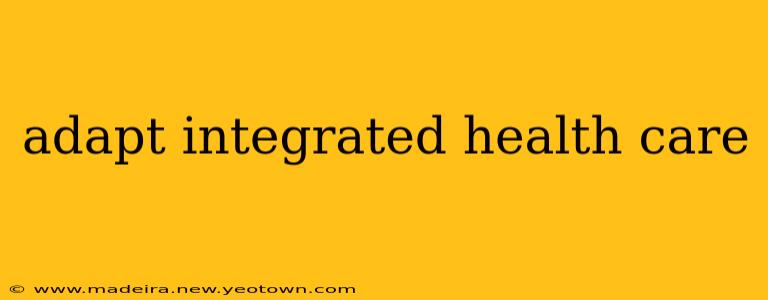Adapting Integrated Healthcare: A Holistic Approach to Modern Medicine
The healthcare landscape is undergoing a dramatic transformation. We're moving away from the fragmented, specialist-centric model of the past towards a more holistic, patient-centered approach: integrated healthcare. But what exactly does this mean, and how is it adapting to the ever-evolving needs of our society? This isn't just about merging different medical disciplines; it's about a fundamental shift in philosophy, focusing on the whole person and their unique journey to well-being.
My journey into understanding integrated healthcare began with a personal experience. A family member faced a complex health challenge that required navigating multiple specialists, resulting in conflicting advice and a feeling of being lost in the system. That's when I realized the power – and the urgent need – for a more coordinated, collaborative approach.
This article delves into the key aspects of adapting integrated healthcare, exploring the challenges and opportunities presented by this revolutionary shift.
What is Integrated Healthcare?
Integrated healthcare goes beyond simply having a primary care physician who coordinates referrals to specialists. It's a philosophy that emphasizes collaboration, communication, and a holistic understanding of a patient's health. This includes considering physical, mental, emotional, and social factors that influence well-being. It's about treating the whole person, not just the disease.
Think of it like this: instead of seeing a cardiologist for heart issues and a therapist for anxiety separately, an integrated healthcare system would ideally facilitate communication and collaboration between these professionals, creating a comprehensive treatment plan that considers the interconnectedness of these conditions.
How is Integrated Healthcare Adapting?
The adaptation of integrated healthcare is a dynamic process. It's driven by technological advancements, evolving patient expectations, and a growing understanding of the importance of preventative care.
-
Technology's Role: Electronic health records (EHRs) are crucial for facilitating communication between providers. Telehealth expands access to care, especially for those in rural areas or with mobility challenges. Data analytics can help identify trends and improve preventative measures.
-
Patient-Centric Care: The emphasis is shifting from provider-driven care to patient-driven care. Patients are more actively involved in their treatment decisions, empowered by access to information and technology. Shared decision-making is becoming the norm.
-
Preventative Care: Integrated healthcare systems prioritize preventative care, recognizing that early intervention can significantly reduce healthcare costs and improve overall health outcomes. This involves proactive screenings, lifestyle counseling, and personalized health plans.
What are the Challenges of Integrated Healthcare?
Despite its promise, adapting integrated healthcare faces significant hurdles:
-
Data Interoperability: Different healthcare systems often use incompatible technologies, hindering seamless data sharing.
-
Financial Incentives: Traditional fee-for-service models don't always incentivize collaboration and coordination. New payment models are needed to support integrated approaches.
-
Regulatory Barriers: Complex regulations can create obstacles to developing and implementing integrated healthcare models.
-
Provider Training & Mindset Shift: Healthcare professionals need training and support to effectively collaborate in an integrated system. A significant shift in mindset is required to move away from a purely specialized approach.
What are the Benefits of Integrated Healthcare?
The potential benefits are substantial:
-
Improved Patient Outcomes: Better coordination of care leads to better health outcomes, reducing hospital readmissions and improving patient satisfaction.
-
Reduced Healthcare Costs: Preventative care and efficient coordination can lead to significant cost savings in the long run.
-
Enhanced Patient Experience: Patients benefit from a more seamless, patient-centric experience, reducing stress and improving their overall well-being.
-
More Efficient Resource Utilization: Integrating services improves the efficient use of healthcare resources.
How Does Integrated Healthcare Address Social Determinants of Health?
Integrated healthcare increasingly recognizes the significant impact of social determinants of health (SDOH) – factors like housing, food security, and access to transportation – on a person's overall well-being. Addressing these factors is becoming a crucial component of providing comprehensive care. Integrated models facilitate connections with community resources to address SDOH, leading to better overall health outcomes.
What is the Future of Integrated Healthcare?
The future of integrated healthcare involves further technological advancements, improved data sharing, innovative payment models, and a continued emphasis on patient-centric care. AI and machine learning will likely play an increasingly significant role in supporting decision-making and improving efficiency. The journey toward truly integrated healthcare is an ongoing evolution, but the potential to transform the healthcare system for the better is immense. It's a future where the focus shifts from treating illness to promoting overall wellness and preventing disease. And that's a future well worth striving for.

